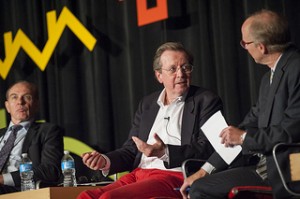 Bristol’s first Elected Mayor, George Ferguson, gave his first State of the City address yesterday. Here, in a post that first appeared at Democratic Audit, David Sweeting reviews the first year of George’s term in office and examines what the impact of Mayoral governance has been.
Bristol’s first Elected Mayor, George Ferguson, gave his first State of the City address yesterday. Here, in a post that first appeared at Democratic Audit, David Sweeting reviews the first year of George’s term in office and examines what the impact of Mayoral governance has been.
It is nearly a year since the first directly elected mayor of Bristol took office. While Bristol is not the only place in the country to have such a mayor, it was the only one of ten cities that said yes to a mayor in referendums held in May 2012. Despite various inducements from central government in the form of looking favourably at city deals, and also the prospect of a mayors’ cabinet with the PM himself, Bristolians were the only citizens in the country at that time to go for the option of replacing a traditional council leader with what many see as an American style figure at the head of city government. So, as the Mayor of Bristol, George Ferguson, prepares for his first ‘state of the city’ speech, it seems appropriate to ask, what difference does having an elected mayor make?
Campaigns for and against directly elected mayors tend to draw on similar arguments. The for camps tend to argue that directly elected mayors will be more democratic and more effective. They argue that when citizens are able to choose the mayor directly, it will lead to greater interest in the political process, more recognition of decision-makers, and therefore that leader will be more accountable once election time comes around. They also argue that directly elected mayors can draw on their direct mandate to influence others in the city, and that a mayor in post for four years can be more effective in making things happen, both inside and outside the council as a result of the stability that their fixed-term brings. The against camps tend to argue the reverse – that directly elected mayors will be less democratic and less effective. There is no way of getting rid of a mayor between elections, so they are unaccountable. And loading decision-making onto one individual centralises power too much, leading to delay and overload. (more…)

